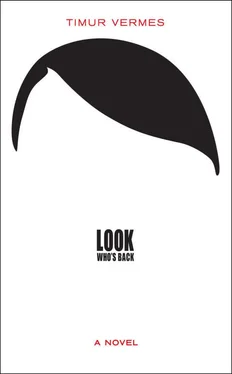All events, characters and dialogues in this book are fictitious. Any similarities with living persons and/or their reactions, or with companies, organisations etc. are coincidental, because one cannot exclude the possibility that these persons would have acted and behaved differently in reality. The author is keen to emphasise that neither Sigmar Gabriel nor Renate Künast have actually spoken with Adolf Hitler.
—————
For those readers who would welcome explanation of some of the characters and terms referred to in this novel, a narrative glossary can be found in the Translator’s Note.
It was probably the German people, the Volk, which surprised me most of all. I really did everything humanly possible to destroy the foundations for a future existence on this soil, this soil which the enemy had desecrated. Bridges, power stations, roads, railways — I gave instructions for every last one to be obliterated. I have since checked when this order was issued — it was in March — and I believe I had made myself perfectly clear. All supply facilities were to be razed, waterworks, telephone systems, resources, factories, workshops, farms, all material assets — everything, and by that I did mean absolutely everything! These matters must be approached with care and precision; a directive such as this can leave no room for doubt. For we all know of the ordinary soldier at the front who, contained within his own particular sector, understandably lacks an overview of the general situation, knowledge of the strategic, tactical necessities. The soldier who comes and says, “Do I really have to set light to this… this… [let’s say] kiosk, too? Can’t we let it fall into enemy hands? Is it really so bad if the kiosk falls into enemy hands?” Bad? Of course it’s bad! The enemy reads newspapers, too, doesn’t he? He will use the kiosk to conduct business, he will turn the kiosk against us, everything he finds will be turned against us! Every material asset — let me underline this once more — every single material asset must be destroyed. Not just houses, but doors too. And door handles. Then the screws, and not only the long ones. The screws must be unscrewed and then ruthlessly bent out of shape. The doors must be ground into sawdust. And then burned to cinders. Else the enemy will show no mercy; he will walk in and out of these doors as it pleases him. But present him with a broken door handle, bent screws and a heap of ashes — well, Mr Churchill, be my guest! At all events these requirements are the brutal consequence of war — of this I have always been aware — and thus the instructions I gave could not have been worded differently, even though the background to my directive was different.
To begin with, at any rate.
It could no longer be denied that the German Volk had ultimately proved itself inferior in the epic struggle against the English, against Bolshevism, against imperialism, thereby — and I will not mince my words — forfeiting its future existence, even at the most primitive level as hunter-gatherers. Accordingly, it lost its right to waterworks, bridges and roads. And door handles, too. This is the reason I issued my directive. It must be said that I also did it in part for the sake of thoroughness, for when I took the odd stroll outside the Reich Chancellery I had to concede that with their Flying Fortresses, the Americans and the English had already relieved us of a substantial volume of the work. Naturally, after the directive was issued, I did not monitor in every minute detail how it was executed. The reader will appreciate how much else I had to do: grappling with the Americans in the West, resisting the Russians in the East, planning the development of the world’s capital city, Germania. In my opinion the Wehrmacht should have been able to cope with any remaining door handles. And this Volk should no longer exist.
As I have now established, however, it is still here.
A fact I find rather difficult to comprehend.
On the other hand, I am here too, and I cannot understand that either.
I remember waking up; it must have been early afternoon. Opening my eyes I saw above me the sky, which was blue with the occasional cloud. It felt warm, and I sensed at once that it was too warm for April. One might almost call it hot. It was relatively quiet; I could not see any enemy aircraft flying overhead, or hear the thunder of artillery fire, there seemed to be no shelling nearby or explosions, no air-raid sirens. It also struck me that there was no Reich Chancellery and no Führerbunker. I turned my head and saw that I was lying on an area of undeveloped land, surrounded by terraces of houses. Here and there urchins had daubed the brick walls with paint, which aroused my ire, and I took the snap decision to summon Grand Admiral Dönitz. Still half asleep, I imagined that Dönitz must also be lying around here somewhere. But then discipline and logic triumphed, and in a flash I grasped the peculiarity of the situation in which I found myself. I do not usually camp out.
My first thought was, “What did I get up to last night?” Seeing as I do not drink, I could rule out any overindulgence in alcohol. The last thing I recalled was sitting on a sofa, a divan, with Eva. I also remembered that I was — or we were — feeling rather carefree; just for once I had decided to put the affairs of state to one side. We had no plans for the evening. Naturally there was no question of going out to a restaurant or to the pictures — entertainment in the capital was gratifyingly thin on the ground, largely as a result of my directive. How could I be sure that Stalin would not be arriving in the city in the coming days? At that point in the war such a turn of events could not be dismissed out of hand. What was absolutely certain was that he would be as unlikely to find a picture house here as he would in Stalingrad. I think Eva and I chatted for a while, and I showed her my old pistol, but when I awoke I was unable to recall any further details. Not least on account of the bad headache I was suffering from. No, my attempts to piece together the events of the previous evening were leading nowhere.
I thus decided to take matters into my own hands and get to grips with my situation. Over the course of my life I have learned to observe, to reflect, to pick up on even the smallest detail to which many learned people pay scant heed, or simply ignore. Thanks to years of iron discipline, I can say with a clear conscience that in a crisis I become more composed, more level-headed, my senses are sharpened. I work calmly, with precision, like a machine. Methodically, I synthesise the information at my disposal. I am lying on the ground. I look around. Litter is strewn beside me; I can see weeds and grass, the odd bush, a daisy, and a dandelion. I can hear voices shouting — they cannot be far away — the noise of a ball bouncing repeatedly on the ground. I look in the direction of these sounds, they are coming from a group of lads playing association football. Not little boys anymore, but probably too young for the Volkssturm. I expect they are in the Hitler Youth, although evidently not on duty. For the time being the enemy appears to have ceased its onslaught. A bird is hopping about in the boughs of a tree; it tweets, it sings. Most people will simply interpret such behaviour as a sign of happiness. But in this uncertain situation the expert on the natural world and the day-to-day battle for survival exploits every scrap of information, however small, and infers that no predators are present. Right beside my head is a puddle which appears to be shrinking; it must have rained, but some time ago now. At the edge of the puddle is my peaked cap. This is how my trained mind works; this is how it worked even then, in a moment of confusion.
Читать дальше















